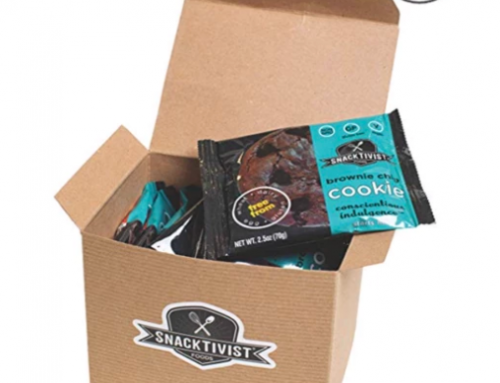Your first production run?
It’s kind of like the first day of school. You need to have all of your paperwork in order, dressed in the right clothes, and make new friends. And not to mention those lists you get of the stuff your kid needs.
If you think of your kid as your company and the list preparer as your co-packer, here’s the list of things you need. By the way this is one chapter in an in-depth series I’ve published called The Complete Guide to Profitable Co-Packing. This guide explains everything about the food manufacturing process and is completely free!
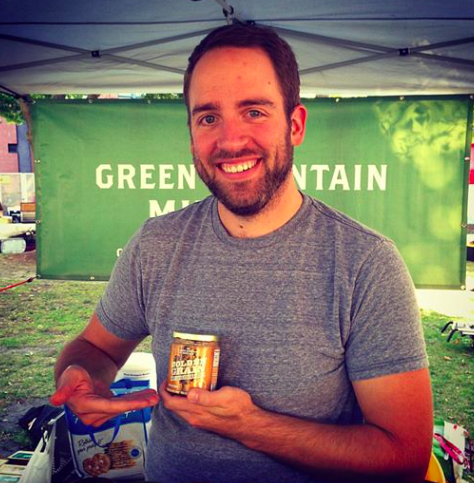
Me with my mustard at a local farmer’s market.
What your food manufacturer needs from you are:
- Scheduled process
- Certificate of Insurance
- Production dates
- Incoming shipment info
- Open communication
- How to make your food production run a success
- My stories working with food manufacturers
1. Scheduled process (optional for some, but recommended for all)
If you make an acidified food (like mustard, jam, pickles, salad dressing), you need a scheduled process. A scheduled process is a document that states your production methods are sound. It also states critical control points, like pH and fill temperature. Scheduled processes can be completed at several college campus across the US like Cornell, University of Maine, and NC State.
Scheduled process are needed by your copacker so they know how to produce your product. Plus, they’re going to want to know any “production secrets” you may have like prep of fresh produce, order of operations, etc.
2. Certificate of Insurance
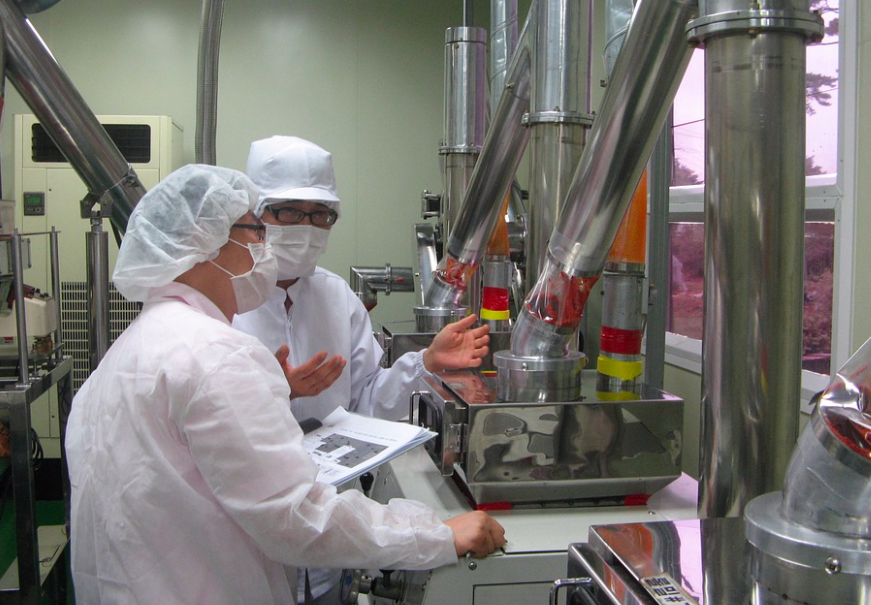
Food Manufacturing Facility.
From day one, you should have $1 million in product liability insurance and $2 million in general aggregate. This products you, your products, and your company from a lawsuit (which hopefully never happens).
You may also have to name your copacking facility as additionally insured. This is sometimes included in your annual premium. If not, it’s $25 – $50 per additionally insured party. This protects your co-packer from liability of your products.
3. Your production dates
How often are you going to need space? How much product will you be producing? Should you schedule these dates ahead of time? Communicate all of this to your copacker because you need to get penciled (err…pened) in to their calendar. The last thing you want is to not be able to meet demand because you can’t get on your co-packer’s schedule! That would be killer.
I like to forecast demand (or at least try) 6 months out and schedule productions accordingly. To give you an example of how crazy I am, I have production scheduled for the entire year 3 months ahead of time. It’s better to have more production dates than you need and cancel them than not enough.
4. Information about incoming shipments
I like to provide my kitchen manager with a heads up when big shipments are coming in like hundreds of pounds of mustard powder or pallets of glass. I ask her when a good delivery time would be and order accordingly. This not only helps her to anticipate when large deliveries will be happening, but it’s respectful and puts me on good terms.
5. Honest and Open Communication
While this isn’t a tangible item, it’s incredibly important. Why? Because you could forget to tell your copacker about a process change or be upset with something and hold a grudge neither are good. I tell my copacker pretty much everything if it relates to our working relationship. She helps me solve problems and I help her solve problems. The relationship was built on honest and open communication and it should always stay that way.
You Might Like This: Download My Food Business Model Canvas with Template
With all of your paperwork in, you’re ready to get your first production run at your new facility under your belt. But, don’t just let it happen. Be proactive and show up at your production. See how everything works and where there could be improvements.
Before you walk in that door, here are a couple things to think about before, during, and after after you fire up the kettle.
How to make your first food manufacturing experience a success
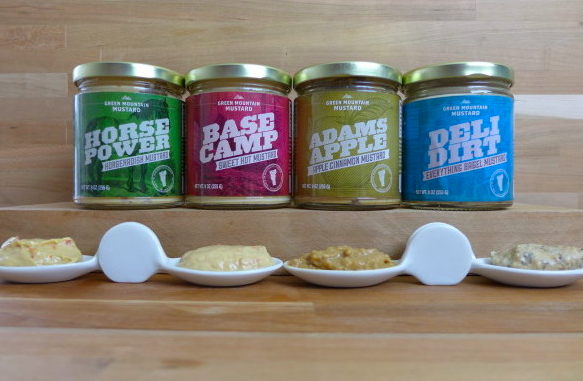
Ever go on a mustard flight?
Note: You may be using your first production to test and scale up your recipe. This is a critical step if you don’t have scaled recipes. From weighing out your ingredients to making sure your spice blends are right when you increase production, do not skip this step. Sure, it might cost you money, but it’s better to screw up a 5 gallon batch of product than 200, right? Glad we agree there.
Produce what you need:
Similar to above, produce what you need, even if this means an increased per unit cost. Producing excess product puts you in a bind because then you have to sell that product. And if you don’t have retailers, distributors, or customers lined up to take the product off your hands, it’ll sit there and go past code.
Produce to demand. If you need to increase by 1020%, that would be fine, too. That way, you have a little extra in case you get a spike in demand.
Stay calm and collected:
Your first production can quickly put you in a state of frantic hairpulling. Take a deep breath. Your copackers have years of experience under their belts. You’re in good hands. Of course, that doesn’t mean problems aren’t going to happen. On my first production day, I brought in the wrong salt (yeah….). I panicked because I needed a significant amount.
Luckily salt is cheap and my co-packer has extra on hand. Learn from me. Everything will be ok. You’ll get help and figure it out.
Audio Lesson: The 6-Step Marketing Plan for a Home-Based Bakery
Don’t critique:
Your co-packer is going to do things differently simply by nature of who they are and the equipment they’re using. Let them work through your recipe. What you do on your stovetop at home is going to be significantly different to how you make your product in bulk.
And you never know, your recipe may end up better in the end because of it. Several of my mustards have better consistency and texture after being made in bulk. All thanks to ideas my kitchen manager had. Watch and learn. Don’t critique until you’re finished.
Debrief at the end:
When you’ve cleaned the kitchen up, talk with your production manager and kitchen manager to review what went right and wrong. Bring up the success of the days and areas you think need to be improved either on your end or the co-packers end. This opens the door with honest communication. While some of it may be tough love, when you drive home you’ll be glad you got everything you wanted off your chest.
Your first production is likely to be smaller. This is the time you should work the kinks out. Get ingredients down, production process down, and picking up of finished goods sorted out.
But keep going to your first few productions. Yes, I realize you are paying a co-packer to make your product, so you shouldn’t have to be there. But, this is the quality of your product we’re talking about. Hear me out:
Why you need to go to your manufacturing facility for your first three production runs:
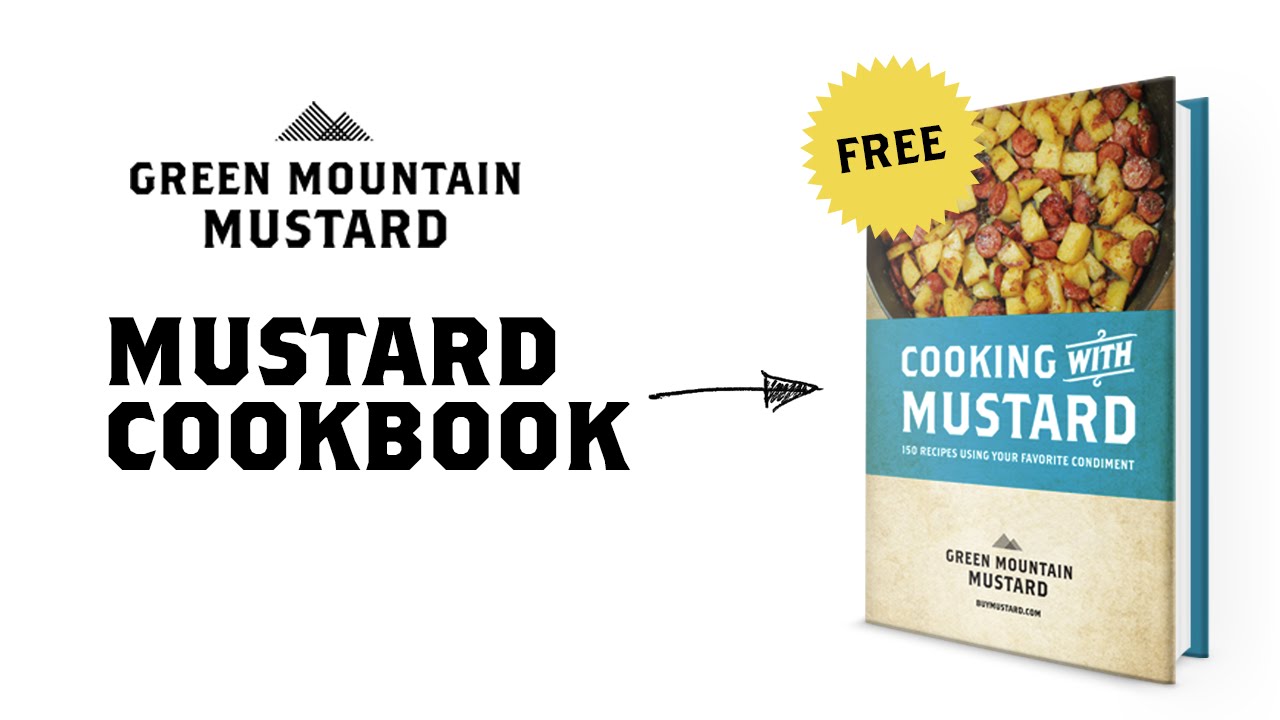
A cookbook I developed that incorporate mustard as a main ingredient to help bolster sales.
Oversee the transition from kitchen to large scale manufacturing
If you have several product lines, chances are everything won’t be made on the first day. When you’re producing a product that’s new to the co-packer, it’s important to be there if something goes wrong. I’ve sent several new recipes to my copacker, scaled up and ready to go, only to find out they were production nightmares. Be there.
Make sure your kitchen manager is producing your product correctly
Wouldn’t it be a bummer if you showed up and your product wasn’t what you expected it to be? It’s happened to me twice. And I’m going to tell you both stories.
Story #1
I wanted to make small jars of mustard. I ordered 4 oz jars that would fit a little bit less mustard in them, so our net wt was actually around 3 oz. My labels said net wt. 3 oz. My jars were filled to 3 oz. And it left a huge gap between the product and the cap. Not only did it create an inefficiency in our process, but I wasn’t told about the problem until I came to pick up the product.
What should have been done?I should have received a phone call from my co-packer explaining the problem. The jars could have been filled to the top and labels reprinted. Instead, I awkwardly sold what looked like empty jars of mustard.
Story #2
Oh, our horseradish mustard. It was the best seller (up until we started selling Maple Wholegrain). And then it all changed. I went down to pick up finished product. I was met with this “We accidentally double the horseradish, but we think it tastes better anyway.”
Ok. Panic set in. My costs just increased on the product about 10%. Plus, this was the way I had to make it moving forward. But, I didn’t know about the problem until I had 100 cases of it in the back of my SUV. While it ended up being a good problem to have (people liked the mustard with more horseradish), it still was cause for concern about what else could happen.
Related Reading: How we started a Handcrafted Nut Butter Company
What should have been done? Better communication. The recipe should have been scrapped and started over with product made to our specifications. Instead, my co-packer ran with it.
While I certainly hope everything goes smoothly with your production experience, know that it might not. Know that you may have to make decisions on the fly, sprint to the grocery store to remedy the situation, and then go back to complete production. It’s happened to every co-packing food producer I’ve talked to nothing goes smoothly when you’re just starting out.
Once you’ve completed your first couple of runs, everything should be falling into place (unless you have problems like I did!).
This means you get more time to focus on sales, instead of spending time slaving over a hot oven. But, it’s important to keep lines of communication open with your co-packer.
As you build trust, credibility, and a better working relationship, your co-packer starts to become a lot more than a producer of your product. Let’s explore this further in our next post.




